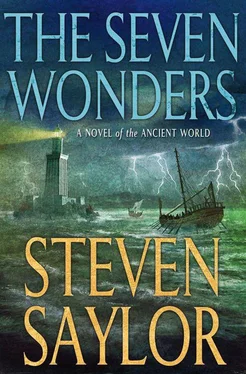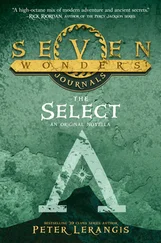Steven Saylor - The Seven Wonders
Здесь есть возможность читать онлайн «Steven Saylor - The Seven Wonders» весь текст электронной книги совершенно бесплатно (целиком полную версию без сокращений). В некоторых случаях можно слушать аудио, скачать через торрент в формате fb2 и присутствует краткое содержание. Год выпуска: 2012, Издательство: Macmillan, Жанр: Исторический детектив, на английском языке. Описание произведения, (предисловие) а так же отзывы посетителей доступны на портале библиотеки ЛибКат.
- Название:The Seven Wonders
- Автор:
- Издательство:Macmillan
- Жанр:
- Год:2012
- ISBN:нет данных
- Рейтинг книги:4 / 5. Голосов: 1
-
Избранное:Добавить в избранное
- Отзывы:
-
Ваша оценка:
- 80
- 1
- 2
- 3
- 4
- 5
The Seven Wonders: краткое содержание, описание и аннотация
Предлагаем к чтению аннотацию, описание, краткое содержание или предисловие (зависит от того, что написал сам автор книги «The Seven Wonders»). Если вы не нашли необходимую информацию о книге — напишите в комментариях, мы постараемся отыскать её.
The Seven Wonders — читать онлайн бесплатно полную книгу (весь текст) целиком
Ниже представлен текст книги, разбитый по страницам. Система сохранения места последней прочитанной страницы, позволяет с удобством читать онлайн бесплатно книгу «The Seven Wonders», без необходимости каждый раз заново искать на чём Вы остановились. Поставьте закладку, и сможете в любой момент перейти на страницу, на которой закончили чтение.
Интервал:
Закладка:
“You wouldn’t have to go far.” Lucius looked sidelong at Ismene. She noticed his gaze and glared back at him.
Marcus laughed. “Lucius, what an old woman you are! Afraid of your own shadow.”
“Am I? Tell me then, why do soldiers die in their sleep here? You remember Aulus, and then Tiberius-both dead, and with no explanation. And why is everyone afraid to go anywhere near the old ruins, especially at night?” Lucius shivered. “Give me Mithridates or a civil war in Italy any day! At least you know what you’re up against when it’s another man with a sword that’s trying to kill you.” He shook his head. “I can’t believe you fellows intend to go traipsing around those ruins tomorrow. There’s something wicked in that place. If you ask me-”
“Now, really!” Tullius drew back his shoulders and raised his chin. “You’re a soldier of Rome, my good man, and I won’t have you talking such rubbish. What was Corinth? Just another city conquered by Rome and put to the sword. Was there a massacre? Undoubtedly. Does that mean that no Roman should ever set foot there, for fear of restless spirits seeking retribution? Nonsense! If a Roman should be afraid to go walking in a city defeated by Romans, then we should have to give up all our conquests and go scampering back to Rome! So much for fearing ghosts. As for this magic you speak of, that sort of thing is women’s work. Oh, some women are always cursing each other, especially these Greeks-‘Hermes of the Underworld, Ambrosia is prettier than me, please make her hair fall out,’ or ‘Great Artemis, helper in childbirth, all the girls have babies now except me, can’t you make their babies get sick and cry all night?’ That sort of rubbish. Women squabbling, and asking deities to take sides-as if the gods have nothing better to do. Hardly the sort of thing for a man to worry about, especially a Roman, and especially a Roman soldier.”
Lucius shook his head. He drained the rest of his cup, then took his leave without another word.
“Superstitious fellow, that one,” said Marcus. “Doesn’t like it here. Always brooding. Don’t take it personally.”
To show that he didn’t, Tullius bought everyone another round. Ismene rolled her eyes, but shambled off to refill her pitcher.
* * *
An hour or so later I staggered upstairs and crawled into the lumpy bed beside Antipater, having eaten too little and drunk too much. When he roused me at dawn the next morning, my head was full of spiders and my mouth was stuffed with cobwebs.
Down in the tavern, Gnaeus the innkeeper served us millet porridge with a small dollop of honey-the simple sort of breakfast he had learned to cook in his centurion days, no doubt. The other guests were not yet stirring. I envied them the luxury of sleeping late.
The wagon driver seemed as hungover as I was.
“How was your visit to the brothel last night?” asked Antipater cheerfully.
The man only groaned and shook his head. True to his word, he took us to the outskirts of the old ruins, hissing at every bump in the road, then turned back toward Lechaeum with a promise that he would return for us before nightfall.
A defensive wall with gates and towers had once surrounded all of Corinth. Only the foundations remained. Within their boundary, it was possible to discern where streets had run and how blocks had been laid out, but almost nothing remained of the buildings except for scattered stones, fallen columns, broken roof tiles, and bits of charred wood amid the high grass. Here and there I saw evidence of a mosaic that had once been part of a floor, but even these had been broken into pieces and scattered. I saw a few pedestals, but no statues.
The place cast a melancholy spell, especially upon Antipater. He wandered about like a man in a dream. There was a strange look in his eyes, as if somehow he could see the city as it once had appeared.
“Did you ever visit Corinth, before it was destroyed?” I said.
He took a deep breath. “I saw it as a boy. My father was appointed by the elders of Sidon to consult the Oracle at Delphi, and he took me along on the trip. We crossed the isthmus coming and going, and each time we spent a couple of nights here in Corinth. But my memories are a child’s memories, vague and dim. It’s impossible to know what I actually remember and what I only imagine, and there’s nothing here to confirm my recollections. Nothing at all! And yet…”
He began to wander again, with a more purposeful look on his face.
“Are you looking for something in particular?” I said.
“I’ll know the right spot when I come to it,” he muttered.
I followed him for an hour or more, walking up and down the streets of a city that no longer existed. A warm wind began to blow, whistling amid the ruins and causing the dry grass to shiver.
At last he came to a halt. He sighed, closed his eyes, and bowed his head. We were in the midst of what once had been a grand house, to judge by the layout of the many rooms and the traces of a garden with a fountain at the center. Antipater threw back his head. With his eyes still shut, he declaimed in Greek:
“I was Rhodope, the rosy-cheeked, and my mother was Boisca.
We did not die of sickness. Nor did we die by the sword.
Instead, when dreadful Ares brought destruction to the city,
My mother seized a slaughtering knife and a cord.
With a prayer, she slew me like a lamb upon the altar.
Then she slew herself, with a noose around her throat.
Thus died two women of Corinth, untouched and free,
Bravely facing their end, cursing any who gloat.”
Utter silence followed his recitation, broken only by the sighing of the wind in the grass. Suddenly I heard someone clapping, then a whole group applauding.
With a start, I spun about. Did I expect to see the ghosts of Corinth? The truth was more prosaic: Titus Tullius and his party had joined us.
“A most excellent recitation!” declared Tullius. He turned to his companions. “Gentlemen, what you’ve just heard is a fictitious epitaph for a dead mother and daughter of Corinth, composed by the late Antipater of Sidon. I was planning to recite it for you myself, but good Zoticus here, with his native Greek, has done a far better job than I could have. That was excellent, Zoticus!”
The party responded with another round of applause. None of the traveling Romans had any idea that it was Antipater of Sidon himself who stood before them.
Usually Antipater was delighted to hear his poems praised, but if looks could kill, Tullius would have fallen dead on the spot. Oblivious of Antipater’s scowl, Tullius recommenced with what appeared to be an ongoing lecture for the edification of his companions.
“So, gentlemen, is this really the spot where the distraught Boisca slew her daughter Rhodope and then committed suicide? Probably not, since both women are most likely fictional creations. The poet’s intent was not to memorialize two actual women, but to remind us of the pathos and terror that must have attended that final day here in Corinth, when the Roman legionnaires under Lucius Mummius pulled down the walls and, under orders from the Senate, proceeded to raze the city to the ground, slaying the men and enslaving the women and children. Any questions?”
“Other Greek cities joined Corinth in the insurgency against Roman rule,” said one of the men, “and yet those cities weren’t destroyed. Why Corinth?”
“First of all, it was Corinth who started the war by attacking her peaceable neighbors, who were perfectly content under Roman rule, and inciting others to revolt. Also, the Senate never forgot a rather nasty incident that occurred in Corinth before the insurrection, when Roman ambassadors, passing by a private house, had feces and urine dumped on them. Sooner or later, there is a price to be paid for such disrespect! And, finally, it was decided that any future insurrections in Greece could best be forestalled by making a strict example of Corinth. As you will recall, in the very same year, Rome’s ancient rival Carthage was utterly destroyed and her people enslaved. As Carthage was annihilated to the west, so Corinth was annihilated to the east. The result: more than fifty years later, the cities of Greece remain firmly under Rome’s control-and greatly to their benefit, I might add, since Rome put an end to centuries of bloody squabbling among them. Sometimes, as terrible as the consequences may be, an example must be made.”
Читать дальшеИнтервал:
Закладка:
Похожие книги на «The Seven Wonders»
Представляем Вашему вниманию похожие книги на «The Seven Wonders» списком для выбора. Мы отобрали схожую по названию и смыслу литературу в надежде предоставить читателям больше вариантов отыскать новые, интересные, ещё непрочитанные произведения.
Обсуждение, отзывы о книге «The Seven Wonders» и просто собственные мнения читателей. Оставьте ваши комментарии, напишите, что Вы думаете о произведении, его смысле или главных героях. Укажите что конкретно понравилось, а что нет, и почему Вы так считаете.










